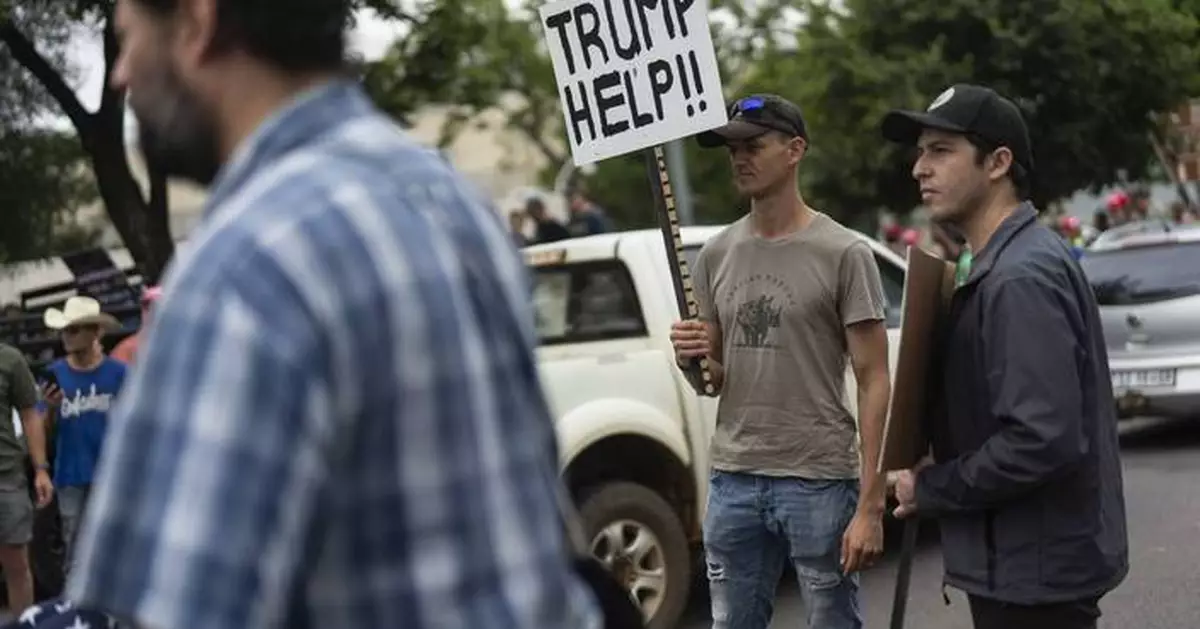The Episcopal Church's migration service is refusing a directive from the federal government to help resettle white South Africans granted refugee status, citing the church's longstanding “commitment to racial justice and reconciliation.”
Presiding Bishop Sean Rowe announced the step Monday, shortly before 59 South Africans arrived at Dulles International Airport outside Washington on a private charter plane and were greeted by a government delegation.
Episcopal Migration Ministries instead will halt its decades-long partnership with the government, Rowe said.
President Donald Trump opened a fast-tracked refugee status to white South Africans, accusing their government of discrimination, even as his administration abruptly shut down the overall U.S. refugee program. The South Africans jumped ahead of thousands of would-be refugees overseas who had been undergoing years of vetting and processing.
Episcopal Migration Ministries has long resettled refugees under federal grants. Rowe said that about two weeks ago, the government contacted it and said it expected the ministry to resettle some of the South Africans under terms of its grant.
“In light of our church’s steadfast commitment to racial justice and reconciliation and our historic ties with the Anglican Church of Southern Africa, we are not able to take this step,” Rowe said. “Accordingly, we have determined that, by the end of the federal fiscal year, we will conclude our refugee resettlement grant agreements with the U.S. federal government.”
Another faith-based group, Church World Service, said it is open to helping resettle the Afrikaners.
South Africa's government has vehemently denied allegations of discriminatory treatment of its white minority residents.
“It has been painful to watch one group of refugees, selected in a highly unusual manner, receive preferential treatment over many others who have been waiting in refugee camps or dangerous conditions for years,” Rowe said. “I am saddened and ashamed that many of the refugees who are being denied entrance to the United States are brave people who worked alongside our military in Iraq and Afghanistan and now face danger at home because of their service to our country.”
He also said many refugees, including Christians, are victims of religious persecution and are now denied entry.
He said the church would find other ways to serve immigrants, such as those already in this country and those stranded overseas.
The move marks the end of a ministry-government partnership that, for nearly four decades, has served nearly 110,000 refugees from countries, including Ukraine, Myanmar and Congo, Rowe said.
It's not the first high-profile friction between the Episcopal Church and the Trump administration. Bishop Mariann Budde of Washington drew Trump's anger in January at an inaugural prayer service in which she urged “mercy” on those fearing his actions, including migrants and LGBTQ+ children.
The Anglican Church of Southern Africa includes churches in South Africa and neighboring countries. It was a potent force in the campaign against apartheid in the 1980s and 1990s, an effort for which the late Archbishop Desmond Tutu received the Nobel Peace Prize in 1984.
Another faith-based refugee agency, Church World Service, says it is open to serving the South African arrivals.
“We are concerned that the U.S. Government has chosen to fast-track the admission of Afrikaners, while actively fighting court orders to provide life-saving resettlement to other refugee populations who are in desperate need of resettlement," Rick Santos, CWS president and CEO, said in a statement.
He added that the action proves the government knows how to screen and process refugees quickly.
“Despite the Administration’s actions, CWS remains committed to serving all eligible refugee populations seeking safety in the United States, including Afrikaners who are eligible for services," he said. “Our faith compels us to serve each person in our care with dignity and compassion.”
The Episcopal ministry and CWS are among 10 national groups, most of them faith-based, that have partnered with the government for refugee resettlement.
Associated Press writer Tiffany Stanley contributed reporting.
Associated Press religion coverage receives support through the AP’s collaboration with The Conversation US, with funding from Lilly Endowment Inc. The AP is solely responsible for this content.

FILE - White South Africans demonstrate in support of U.S. President Donald Trump in front of the U.S. embassy in Pretoria, South Africa, Saturday, Feb. 15, 2025. (AP Photo/Jerome Delay, File)
Teyana Taylor and Jenna Ortega took risks on the Golden Globes red carpet with celebrities opting for classic black, velvet tuxes and voluminous ball gowns.
Taylor wore a custom slinky gown in black that showed off some skin and featured a deep low-cut back with a glittery low-hanging bow. Lisa of Blackpink arrived on the carpet Sunday in a semi-sheer goth-inspired look by Jacquemus in black. Ayo Edebiri and Selena Gomez were also in black.
Edebiri kept it classic in a black off-the-shoulder Chanel dress embellished with jewels on the shoulders from Matthieu Blazy’s Métiers d’Art 2026 show. Gomez also arrived in a black dress with a white feathered bustier.
Host Nikki Glaser, who is hosting for the second time, brought some color to the carpet where she wore a strapless satin blush-pink corseted satin gown with a full skirt by Zuhair Murad.
Celebrities are holding onto their gowns and watching their steps as they pose for photos on this year’s Golden Globes red carpet. Like the Met Gala, fashion stars are lining up steps for their picture-perfect moment.
The 83rd Golden Globes gives a glimpse into how A-listers and rising stars will each showcase their original take on fashion. Since 1944, the show has honored the best in film and television, and for the first time, podcasters have been added to the awards lineup.
The carpet — at The Beverly Hilton in Beverly Hills, California — is a chance for nominees to make a statement, though some are beholden to fashion houses who pay them as ambassadors.
While some fashionistas were predicting white as the color of the night after several celebrities chose it for the Critics Choice Movie Awards, there were several pops of color at the Globes.
“Sinners” star Wunmi Mosaku stunned in a flowy yellow Matthew Reisman gown. The mother-to-be revealed her baby bump on the carpet.
“Sinners” is up for several nominations including best motion picture.
The male nominees didn’t stray too far from traditional looks. Actor Colman Domingo pared down his typical colorful suits for a black suited look adorned with silver leaves.
“Heated Rivalry” star Hudson Williams brought the cummerbund back but with a laid-back twist. The breakout star paired a white-peak lapel dinner jacket with an unbuttoned silk shirt. Williams, along with his co-star Connor Storrie, will serve as presenters during the award ceremony. Storrie opted for a Saint Laurent by Anthony Vaccarello tuxedo jacket paired with a tie and sunglasses.
Jenna Rosenstein, beauty director for Harper’s Bazaar, noted Storrie's hair transformation. Storrie plastered his trademark curly locks into a shaggy, retro-inspired mullet. Among the women, beauty highlights included the swoopy bobs of Edebiri and Gomez, she said.
For more coverage of the 2026 Golden Globe Awards, visit: https://apnews.com/hub/golden-globe-awards

Connor Storrie arrives at the 83rd Golden Globes on Sunday, Jan. 11, 2026, at the Beverly Hilton in Beverly Hills, Calif. (Photo by Jordan Strauss/Invision/AP)

Colman Domingo arrives at the 83rd Golden Globes on Sunday, Jan. 11, 2026, at the Beverly Hilton in Beverly Hills, Calif. (Photo by Jordan Strauss/Invision/AP)

Ayo Edebiri arrives at the 83rd Golden Globes on Sunday, Jan. 11, 2026, at the Beverly Hilton in Beverly Hills, Calif. (Photo by Jordan Strauss/Invision/AP)

Jenna Ortega arrives at the 83rd Golden Globes on Sunday, Jan. 11, 2026, at the Beverly Hilton in Beverly Hills, Calif. (Photo by Jordan Strauss/Invision/AP)

Jenna Ortega arrives at the 83rd Golden Globes on Sunday, Jan. 11, 2026, at the Beverly Hilton in Beverly Hills, Calif. (Photo by Jordan Strauss/Invision/AP)

Teyana Taylor arrives at the 83rd Golden Globes on Sunday, Jan. 11, 2026, at the Beverly Hilton in Beverly Hills, Calif. (Photo by Richard Shotwell/Invision/AP)

Teyana Taylor arrives at the 83rd Golden Globes on Sunday, Jan. 11, 2026, at the Beverly Hilton in Beverly Hills, Calif. (Photo by Jordan Strauss/Invision/AP)

Justine Lupe arrives at the 83rd Golden Globes on Sunday, Jan. 11, 2026, at the Beverly Hilton in Beverly Hills, Calif. (Photo by Jordan Strauss/Invision/AP)

Brittany Snow arrives at the 83rd Golden Globes on Sunday, Jan. 11, 2026, at the Beverly Hilton in Beverly Hills, Calif. (Photo by Jordan Strauss/Invision/AP)

Brittany Snow arrives at the 83rd Golden Globes on Sunday, Jan. 11, 2026, at the Beverly Hilton in Beverly Hills, Calif. (Photo by Jordan Strauss/Invision/AP)

Wunmi Mosaku arrives at the 83rd Golden Globes on Sunday, Jan. 11, 2026, at the Beverly Hilton in Beverly Hills, Calif. (Photo by Jordan Strauss/Invision/AP)

Lisa arrives at the 83rd Golden Globes on Sunday, Jan. 11, 2026, at the Beverly Hilton in Beverly Hills, Calif. (Photo by Jordan Strauss/Invision/AP)

Ariana Grande arrives at the 31st Annual Critics Choice Awards on Sunday, Jan. 4, 2026, at The Barker Hanger in Santa Monica, Calif. (Photo by Richard Shotwell/Invision/AP)























